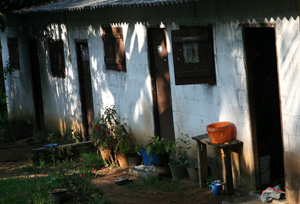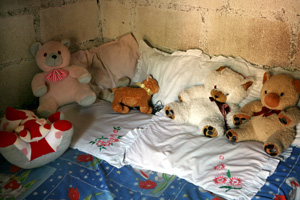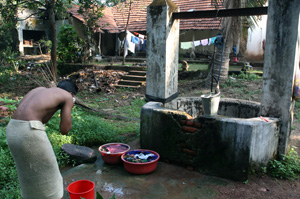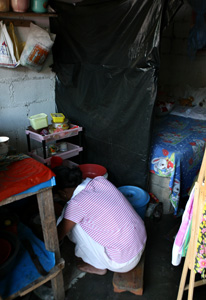The tenth of every month is a day of celebration. They converge on the “hotel” opposite their workplaces and either indulge in a feast of fried rice and roast chicken or carry back parcels to their dark and dingy rooms, resembling rows of estate line rooms.
In most instances that would be the only day that they eat some form of protein, for let alone meat they simply cannot afford fish, egg or even dried fish on any other day.
 |
| Squalid living conditions (above) and (below) soft toys add a little ‘homely touch’ |
 |
 |
| Some of the girls are compelled to use the common well. |
|
| A dimly-lit room-cum-kitchen that is home for this girl |
A cheap and easy-to-cook vegetable such as brinjal with rice would be their staple diet on most days.
This is what The Sunday Times found on a tour of the Biyagama free trade zone (FTZ) on a Sunday morning to get a glimpse into the lives of those derogatorily dubbed “garment kello” or worse still “juki badu” but who net in the largest quantum of foreign exchange to this country.
These are the thousands of young women, not only at Biyagama but also at other FTZs, who are caught between two worlds – the still traditional village with few facilities and simple needs and large industrial towns with their veneer of affluence but many pitfalls for those not inured in the ways of the world.
"Most girls generally work for five years in garment factories and return to their villages to get married,’’ says 26-year-old Ramani* sitting on the floor and chopping vegetables for her lunch in the dimly-lit room-cum-kitchen she calls home.
She is hoping to return to her village soon to get married to a bus conductor aiya she has been associating with. Through a sittu that she is part of every month, Ramani has bought herself a gas cooker, a television, a fan and a mobile phone, to begin her new life, with a few luxuries, away from the factory.
Quoting a survey done by the Health and Safety Division of the Labour Department, trade union activist Anton Marcus points out that 66% of garment factory girls have anaemia. “They cook a scrap meal in the night and then leave the remnants for the morning. They would not even know what a balanced diet is,” says Mr. Marcus who is Joint Secretary of the FTZs and General Service Employees’ Union, explaining that these would be the next generation of mothers.
For the girls working in the FTZ, malnourishment and poor facilities such as lack of water and lavatories sans doors a distance from their rooms are the least of their problems.
Away from their families and villages, these girls not only face sexual harassment on the road but also within the congested compounds they live in.
Sexual harassment was seen as a serious problem for young girls going to or returning from work, by 21-year-old Kumari*, who says with stoic resignation that they are compelled to come to towns far away from home because they cannot get the same wages. “We are forced to come to the city for work,” she laments, explaining that they move around in groups to avoid these problems.
As girls work at odd hours and also sometimes have to go to the common well for their baths, chain snatchings have become routine, while catcalls and obscenities are also everyday happenings which they ignore. “Zipper men”, the girls’ name for perverts, stalk them.
"Three-wheeler drivers stop and ask, ‘Nangi koheda yanne’, offering to give a ride,” said Kumari.
Certain groups in these areas think they can do whatever they want with the girls, stresses Mr. Marcus, explaining that in addition to harassing them, they sometimes strike up love affairs to get money from the girls. “The girls are lonely and sometimes gullible,” he says adding that many of them fall into trouble and undergo illegal abortions.
There are many quacks operating in these areas, according to him, but these problems are never discussed in the open. “It’s accepted and forgotten.”
A recent trend has also been cyclists and motorcyclists “putting vettu” (veering) towards them and sometimes going out of control and actually knocking them down. A girl who was seriously injured was not even paid for her medical treatment, some alleged, adding that even though a complaint was made to the police no action was taken against the culprit.
As there is a flow of workers to the FTZ, many townsfolk around the zone have built rooms with poor facilities to meet the demand. While in many such boardings, the women have to draw water for their drinking, cooking and bathing from a well in the garden, the landlord and his family enjoy water on tap. Most of the rooms the girls occupy are windowless and congested.
The living conditions are atrocious, acknowledges Mr. Marcus. without many changes since the FTZs were begun, although rents have risen. These are places where thousands have come for work. At Biyagama alone there are about 10-12,000 female workers. Some boardings have a water supply, but many do not. The girls have to get up at the crack of dawn to queue up for a bucket of water.
Whereas earlier they lived in girls’-only boarding rooms in a compound, now the rows of rooms have a mix of men and women. Often friendships spring up, with an easy lifestyle where “aiyas” and “nangis” find comfort and protection from each other, leading to complications in their lives such as promiscuity and unwed pregnancies.
Wattes have rows of rooms, with girls on one side and boys on the other. The girls don’t have any privacy, says Mr. Marcus, while Nilmini* adds: “Sometimes, having a male around provides us some protection from outsiders. On the other hand, there could be problems of a sexual nature. Privacy, since we use the same toilets, is an issue."
In their personal lives too they face difficulty. They have come in search of higher-paying jobs because their families are poverty-stricken. Most of them send part of their wages for cultivations back home, without which their parents and siblings would face starvation.
Kamala pays a third of her wages as boarding fees, another third is sent home and she manages with difficulty to make ends meet while she toils at her work, with the balance. Eating frugally also means that these women are prone to illness.
On average most of them earn between Rs. 6,000 to Rs.10,000 with overtime, and it is within the first two months that they are lured to the glitter of gold and flashy clothes.
“We buy a gold chain and then a pair of bangles soon after we come to the zone. Then we buy some clothes,” says Nilmini. Thereafter, reality dawns – the onus of sending money home and also living in a place where there is no support system.A consensus among the girls, however, was that their working conditions are acceptable, with only one or two saying that they are reprimanded if targets cannot be met or are harassed to do overtime.
As they labour on, the FTZ girls have a new spectre in their lives, which only some seemed to comprehend – the loss of jobs due to a lower demand for their products. For them a job amidst much hardship is better than no job at all.
(* Names changed to protect their identities) |




